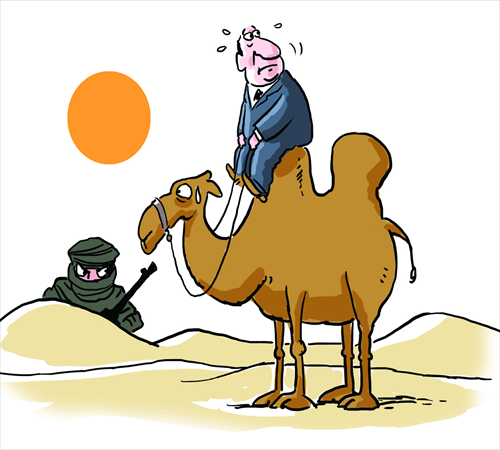HOME >> OP-ED
Old tales show memories of Silk Road
Source:Global Times Published: 2014-6-25 18:48:01

Illustration: Liu Rui/GT
Nasirdin Apandi, a semi-mythological figure based on a real 13th century jurist, humorist, and teacher, is a household name in the Xinjiang Uyghur Autonomous Region.The Turkish people are also very familiar with the stories of this trickster-teacher, whose stories are famous throughout the whole of Central Asia and the Middle East under different variants of the name "Nasreddin Hodja." They were transmitted across the old Silk Road.
As I understand, there were two Silk Roads, one was an land road from the north and the other was the sea route from the south.
The destination of the sea route was the Netherlands and the destination of the land road was Istanbul when the country was ruled by the Byzantine Empire.
We can know about the role of the Silk Road from the simple word - tea. Tea used to be imported from China through Russia. That's why the pronunciation of tea in the three countries is similar to the Chinese word "cha."
China aims to revitalize the ancient Silk Road through the Silk Road economic belt, a notion raised by Chinese President Xi Jinping. The belt, which is mainly about the land route of the Silk Road, is supposed to start from China's Xi'an and end in the Grand Bazaar in Istanbul. What the Turkish side is thinking about is how this route of over 6,000 kilometers can bring benefits to both countries.
It is no long feasible to connect the two by camels. Now we need camels with engines, which are high-speed railways. That means we also need to reduce the danger and coordinate with countries along the route as we need a stable and terrorism-free region to develop economy.
Terrorism exists in many developing countries. Some forces in the world do not wish to see emerging powers and they would hinder the development pace of these powers.
Both China and Turkey have been affected by terrorism and they oppose terrorist acts. The Central Asian region is also a brewing ground for terrorism.
The role of Afghanistan and Pakistan is also vital in restoring the Silk Road, especially in fighting against terrorism. Pakistan is a sincere friend of China and Turkey.
The two countries take Pakistan into consideration when making important decisions concerning Central Asia, as the rich energy resources in Central Asia also go through Pakistan and India.
There are constant terrorist attacks in Pakistan and Afghanistan. Terrorism is difficult to eliminate. What the two countries need to do first is to improve local people's livelihood, because almost all revolutions in the world have been initiated by impoverished people.
No country expects a revolution. If resources along the Silk Road are to be mobilized, political stability must be ensured along the road.
Turkey hopes for a greater China and would like to cooperate with China in the Silk Road economic belt. Now the world's economy is dominated by the dollar and euro. Perhaps we need a third currency - the yuan, which will encourage competition among different currencies and be good for the world's economy.
The article was compiled by Global Times reporter Wang Wenwen based on an interview with Yavuz Onay, chairman of the Turkish Chinese Chamber of Commerce and Industry based in Istanbul. wangwenwen@globaltimes.com.cn
Posted in: Viewpoint